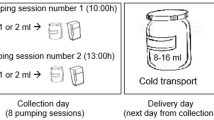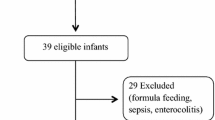Abstract
We conducted an exploratory longitudinal study to evaluate the macronutrient composition of human milk in mothers delivering very preterm infants ≤ 32 weeks over the first 4 weeks of lactation and the association of human milk composition with maternal and neonatal factors A total of 213 human milk samples collected in the morning between 8 am and 12 pm from 60 eligible mothers were analyzed on 7 (n = 60), 14 (n = 60), 21 (n = 52), and 28 (n = 41) days of lactation by infrared transmission spectroscopy. The true protein content decreased significantly over 4 weeks (mean difference (95% confidence interval)) (MD (95% CI)) week 1 and week 4 = 0.2 g (0.037 to 0.363, P = 0.009)). On the contrary, the mean fat and calorie content showed significant increase over time (MD (95% CI)) = − 1.03 g (− 1.719 to − 0.343, P = 0.001) and − 9.0 kcal/dl (− 15.170 to − 2.830, P = 0.001), respectively). There was no difference in the carbohydrate content of human milk over 4 weeks. Macronutrient composition was independent of maternal parity, mode of delivery, pre-pregnancy body mass index, umbilical artery Doppler flows, previous breast feeding experience, neonatal centile status, gestation, and infant’s weight at birth. Multiple regression analysis of human milk composition with mother’s dietary components showed no significant association.
Conclusion
We conclude that in mothers who deliver very preterm infants ≤ 32 weeks, true protein content decreased, fat and calorie content increased, and carbohydrate content remained stable in human milk during first 4 weeks of lactation. Human milk macronutrient composition was independent of various maternal and neonatal factors including maternal body mass index and dietary intake.
Trial registration
CTRI/2017/02/007895
What is Known: • Preterm human milk has high temporal and inter-individual variation in the macronutrient composition. What is New: • In mothers who deliver very preterm infants < 32 weeks, true protein content decreases, fat and calorie content increases, and carbohydrate content remains stable in human milk during first 4 weeks of lactation. • Human milk macronutrient composition is independent of various maternal and neonatal factors including maternal body mass index and dietary intake. |
Similar content being viewed by others
Abbreviations
- HM:
-
Human milk
- VLBW:
-
Very low birth weight
- EHM:
-
Expressed human milk
- BMI:
-
Body mass index
References
Wight NE (2001) Donor human milk for preterm infants. J Perinatol 21:249–254. https://doi.org/10.1038/sj.jp.7200533
Kler N, Thakur A, Modi M, Kaur A, Garg P, Soni A, Saluja S (2015) Human milk fortification in India. Nestle Nutr Inst Workshop Ser 81:145–151. https://doi.org/10.1159/000365904
Embleton ND (2007) Optimal protein and energy intakes in preterm infants. Early Hum Dev 83:831–837. https://doi.org/10.1016/j.earlhumdev.2007.10.001
Dogra S, Thakur A, Garg P, Kler N (2017) Effect of differential enteral protein on growth and neurodevelopment in infants <1500 g: a randomized controlled trial. J Pediatr Gastroenterol Nutr 64:e126–e132. https://doi.org/10.1097/MPG.0000000000001451
Gidrewicz DA, Fenton TR (2014) A systematic review and meta-analysis of the nutrient content of preterm and term breast milk. BMC Pediatr 14:216. https://doi.org/10.1186/1471-2431-14-216
Kreissl A, Zwiauer V, Repa A, Binder C, Thanhaeuser M, Jilma B, Berger A, Haiden N (2016) Human Milk Analyser shows that the lactation period affects protein levels in preterm breastmilk. Acta Paediatr 105:635–640. https://doi.org/10.1111/apa.13348
Narang AP, Bains HS, Kansal S, Singh D (2006) Serial composition of human milk in preterm and term mothers. Indian J Clin Biochem 21:89–94. https://doi.org/10.1007/BF02913072
Mahajan S, Chawla D, Kaur J, Jain S (2017) Macronutrients in breastmilk of mothers of preterm infants. Indian Pediatr 54:635–637. https://doi.org/10.1007/s13312-017-1124-0
Available from: http://www.dietsoft.in/. Accessed on November 15, 2018.
Fenton TR, Kim JH (2013) A systematic review and meta-analysis to revise the Fenton growth chart for preterm infants. BMCPediatr 13:59. https://doi.org/10.1186/1471-2431-13-59
Zachariassen G, Faerk J, Grytter C, Esberg BH, Hjelmborg J, Mortensen S, Thybo Christesen H, Halken S (2011) Nutrient enrichment of mother’s milk and growth of very preterm infants after hospital discharge. Pediatrics 127:e995–e1003. https://doi.org/10.1542/peds.2010-0723
Mimouni FB, Lubetzky R, Yochpaz S, Mandel D (2017) Preterm human milk macronutrient and energy composition: a systematic review and meta-analysis. Clin Perinatol 44:165–172. https://doi.org/10.1016/j.clp.2016.11.010
Zachariassen G, Fenger-Gron J, Hviid MV, Halken S (2013) The content of macronutrients in milk from mothers of very preterm infants is highly variable. Dan Med J 60:A4631
Bauer J, Gerss J (2011) Longitudinal analysis of macronutrients and minerals in human milk produced by mothers of preterm infants. Clin Nutr 30:215–220. https://doi.org/10.1016/j.clnu.2010.08.003
Aleali F, fallahi M, Kazemian M, Fakhraee S, Afjeh A (2018) Longitudinal changes in the macronutrient contents of breast milk in the mothers with preterm delivery. Iranian J Neonatol IJN 9:29–36. https://doi.org/10.22038/ijn.2018.22783.1272
Bulut Ö, Çoban A, İnce Z (2019) Macronutrient analysis of preterm human milk using mid-infrared spectrophotometry. J Perinat Med 47:785–791. https://doi.org/10.1515/jpm-2019-0105
Dutta S, Saini S, Prasad R (2014) Changes in preterm human milk composition with particular reference to introduction of mixed feeding. Indian Pediatr 51:997–999. https://doi.org/10.1007/s13312-014-0545-2
Quinn EA, Largado F, Power M, Kuzawa CW (2012) Predictors of breast milk macronutrient composition in Filipino mothers. Am J Hum Biol 24:533–540. https://doi.org/10.1002/ajhb.22266
Dizdar EA, Sari FN, Degirmencioglu H, Canpolat FE, Oguz SS, Uras N, Dilmen U (2013) Effect of mode of delivery on macronutrient content of breast milk. J Matern Fetal Neonatal Med 27:1099–1102. https://doi.org/10.3109/14767058.2013.850486
Bzikowska-Jura A, Czerwonogrodzka-Senczyna A, Olędzka G, Szostak-Węgierek D, Weker H, Wesołowska A (2018) Maternal nutrition and body composition during breastfeeding: association with human milk composition. Nutrients 10:1379. https://doi.org/10.3390/nu10101379
Casadio YS, Williams TM, Lai CT, Olsson SE, Hepworth AR, Hartmann PE (2010) Evaluation of a mid-infrared analyzer for the determination of the macronutrient composition of human milk. J Hum Lact 26:376–383. https://doi.org/10.1177/0890334410376948
Silvestre D, Fraga M, Gormaz M, Torres E, Vento M (2014) Comparison of mid-infrared transmission spectroscopy with biochemical methods for the determination of macronutrients in human milk. Matern Child Nutr 10:373–382. https://doi.org/10.1111/j.1740-8709.2012.00431.x
Fusch G, Rochow N, Choi A, Fusch S, Poeschl S, Ubah AO, Lee SY, Raja P, Fusch C (2015) Rapid measurement of macronutrients in breast milk: how reliable are infrared milk analyzers? Clin Nutr 34:465–476. https://doi.org/10.1016/j.clnu.2014.05.005
Agostoni C, Buonocore G, Carnielli VP, De Curtis M, Darmaun D, Decsi T, Domellöf M, Embleton ND, Fusch C, Genzel-Boroviczeny O, ESPGHAN Committee on Nutrition et al (2010) Enteral nutrient supply for preterm infants: commentary from the European Society of Paediatric Gastroenterology, Hepatology and Nutrition Committee on Nutrition. J Pediatr Gastroenterol Nutr 50:85–91. https://doi.org/10.1097/MPG.0b013e3181adaee0
Italianer MF, Naninck EFG, Roelants JA, van der Horst GTJ, Reiss IKM, Goudoever JBV, Joosten KFM, Chaves I, Vermeulen MJ (2020) Circadian variation in human milk composition, a systematic review. Nutrients 12:2328. https://doi.org/10.3390/nu12082328
Acknowledgements
We would like to thank Nutricia International Private Limited for providing the Milk Analyzer to Sir Ganga Ram Hospital for the purpose of this research.
Author information
Authors and Affiliations
Contributions
AT and NK conceptualized the project and wrote the protocol. P Gandhi and SG had primary responsibility on patient screening, enrolment, and data collection. AT performed the statistical analysis and wrote the manuscript. NK and PG supervised during enrolment, outcome assessment, and manuscript writing. All authors approved the final manuscript.
Corresponding author
Ethics declarations
Ethics approval
This study was ethically approved on 28th November 2015, Ethics committee, Sir Ganga Ram Hospital (EC/11/15/919)
Consent to participate
Consent for participation was obtained from the mothers.
Consent for publication
Not applicable
Conflict of interest
The authors declare no competing interests.
Additional information
Communicated by Daniele De Luca
Publisher’s note
Springer Nature remains neutral with regard to jurisdictional claims in published maps and institutional affiliations.
Rights and permissions
About this article
Cite this article
Thakur, A., Kler, N., Garg, P. et al. Macronutrient analysis of human milk and factors associated with its composition in mothers of preterm infants ≤ 32 weeks. Eur J Pediatr 180, 3527–3534 (2021). https://doi.org/10.1007/s00431-021-04158-0
Received:
Revised:
Accepted:
Published:
Issue Date:
DOI: https://doi.org/10.1007/s00431-021-04158-0




